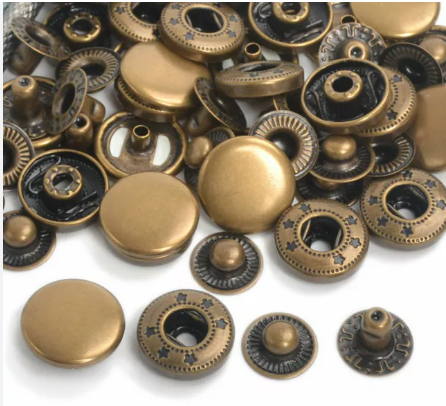In the era of fast fashion, most clothes are designed for short-term use — a broken zipper, a torn hem, or a change in size is enough reason to throw them away. But what if a tiny piece of hardware could change that?
Snap fastener buttons — small, durable, and easy to use — are not just functional closures. They are a powerful tool in the movement for sustainable fashion.
Whether you’re a clothing designer, brand owner, or conscious shopper, understanding how to use snap buttons can transform the way clothes are made, worn, and reused.

🔧 1. Repair, Don’t Replace: Extending Garment Life
Most garments today are discarded due to minor issues like broken zippers, lost buttons, or frayed edges. But when designed with snap buttons:
- A detachable collar or cuff can be easily replaced if damaged.
- Torn parts like a hemline or sleeve can be snapped off and replaced, not the entire item.
- Clothes become modular, so when one part fails, the rest still functions.
🧠 Key Insight:
Snap fasteners turn “single-piece” clothing into a set of repairable modules, reducing waste and increasing value.
🔄 2. Modular Fashion: One Garment, Many Lives
Snap fasteners enable the creation of transformable garments — clothing that can change shape, function, or style based on the user’s needs.
Real-world applications:
- Add or remove sleeves, hoods, or linings depending on the weather
- Create a skirt with adjustable layers for different looks
- Use the same shirt base with snap-on collars in multiple styles
💡 Why it matters:
- Users buy less but wear more
- Clothes adapt across seasons and occasions
- Reduces wardrobe clutter and overconsumption
🔁 One design = multiple styles = less production = less waste
👶 3. Adjustable Fit: Clothes That Grow With You
Children grow fast, pregnant bodies change, and adults fluctuate in size. Snap buttons allow clothes to adjust accordingly — prolonging wearability across life stages.
Example designs:
- Baby bodysuits with multiple snap positions on the crotch and shoulders
- Toddler pants with snap-adjustable waistbands
- Maternity wear with expandable panels attached by snaps
- Unisex pieces that adjust across sizes
🔍 Sustainability Impact:
Clothing that grows with the user = fewer new items needed = lower environmental footprint
🧩 4. Upcycling Made Functional and Fashionable
Upcycling is about transforming old materials into something new — but without functional design, upcycled clothes often end up unwearable. Snap fasteners solve this.
Examples of snap-enhanced upcycling:
- Turn old jeans into modular bags with snap-on pockets
- Make a patchwork shirt with snap-together fabric panels
- Add snap-removable badges, tags, or accessories to old T-shirts
🧷 Snap buttons bring interchangeability to upcycled fashion, making it wearable, flexible, and fun.
🌱 5. Better Products, Smarter Brands
If you’re a designer or own a fashion brand, using snap buttons is more than practical — it’s a story worth telling.
Business benefits:
- ✅ Highlight sustainability on your product page
- ✅ Reduce returns (repairs > replacements)
- ✅ Offer customization, boosting user engagement
- ✅ Earn loyalty from eco-conscious consumers
- ✅ Use fewer raw materials by selling detachable modules
👗 A snap-on sleeve pack might generate less carbon than making 3 new shirts.
🛠 Recommended Snap Fastener Types for Sustainable Fashion
| Model | Best For | Material | Features |
|---|---|---|---|
| SS-ECO | Lightweight clothing | Recycled nylon | Low-profile, recyclable |
| SS-DURA | Bags & outerwear | Stainless steel | Rust-resistant, heavy-duty |
| SS-COLOR | Kids’ clothes | Colored plastic | Bright, lead-free, customizable |
| SS-MODULAR | Transformable design | Brass core | Reinforced grip, multi-use |
📦 Explore our full snap fastener collection →
✅ Final Thought: One Snap, Big Impact
Snap fastener buttons may be small, but their impact on fashion’s sustainability is huge:
- ♻️ Enable repairs
- 🧩 Support modularity
- 👶 Extend usability
- 🧷 Make upcycling functional
- 💼 Help brands reduce waste & tell better stories
In a throwaway world, smart design wins. So next time you design a piece — think beyond style.
Think about snaps.

